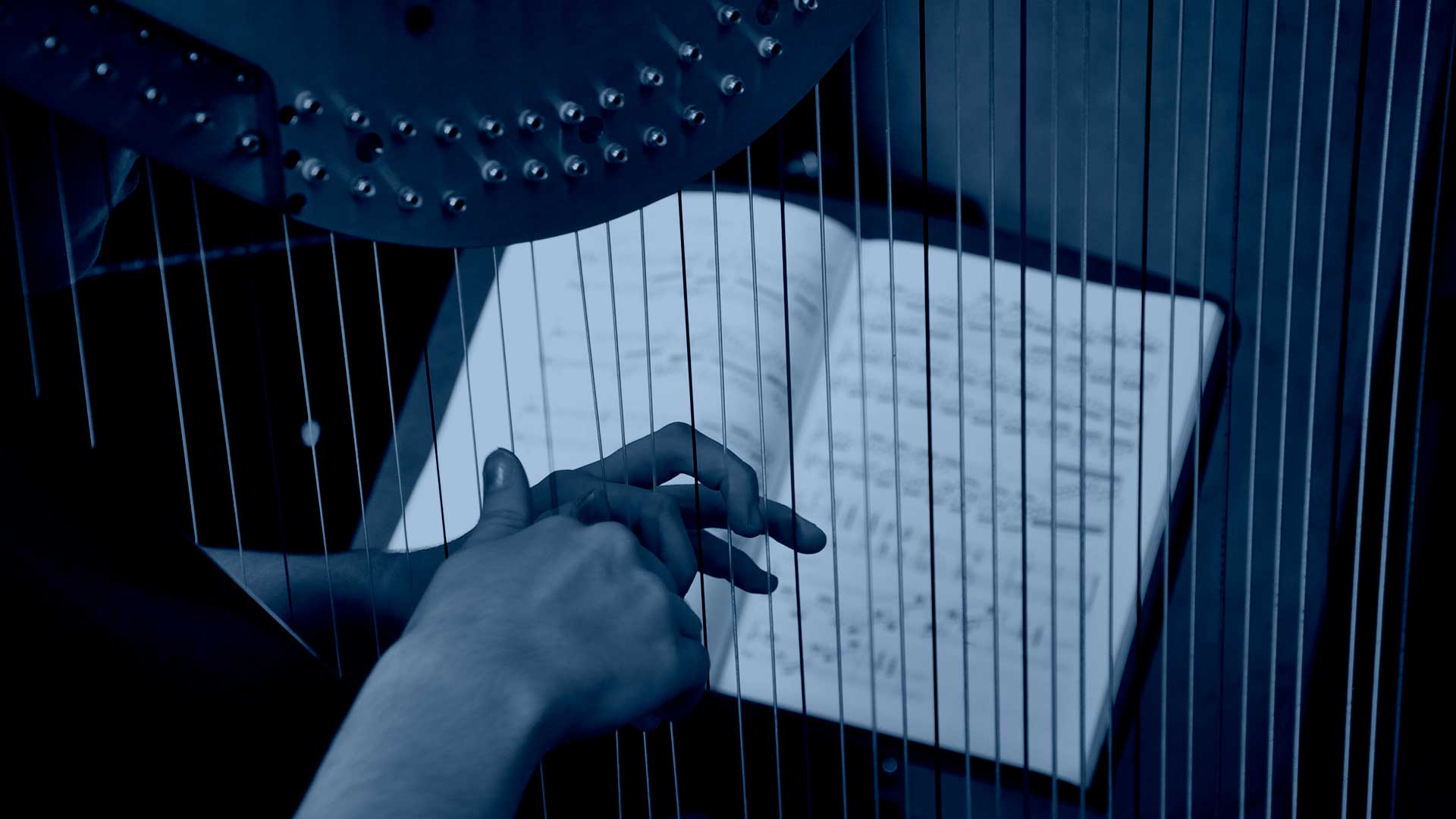Performance: classical and contemporary music

The specialty of Interpretation of Classical and Contemporary Music trains highly qualified professionals in this field, possessing their own language and aesthetics, and prepared to work with those formats, media, genres and contexts that best suit the labor demand of our time. The modalities in which this specialty can be studied cover all orchestral instruments, in addition to piano, singing, guitar, organ and accordion.
Curricula
Orchestra instruments
As a graduate in Classical and Contemporary Music Performance, you will have a complete mastery of the interpretive techniques of the instrument and its repertoire and, where appropriate, of complementary instruments.
Therefore, at the end of your studies you will have achieved the necessary preparation to perform a high-level interpretive task, according to the characteristics of your modality and specialization, either in the role of soloist, as part of a group, or as to music and dance accompaniment. You will also learn about the technical and acoustic characteristics of your instrument, delving into its historical development.
The theoretical and analytical knowledge acquired will facilitate your access to postgraduate studies and other fields such as teaching, research or music criticism.
The curriculum consists of basic training subjects, compulsory specializations, electives and final degree work, which includes a recital open to the public and a written work. The compulsory subjects of the specialty include mainly the subjects of instrument or voice, complementary instrumental training and ensemble music, and include subjects such as:
For more information, see this program’s curriculum:
| Orchestra instruments: Clarinet, Double Bass, Bassoon, Flute, Oboe, Saxophone, Trombone, French Horn, Trumpet, Tuba/Bombardino, Viola, Violin, Cello. |
| Harp; Percussion; Accordion; Singing; Guitar; Organ; Piano |
ESMUC brings qualified and very diverse teachers in terms of aesthetics, styles, techniques, media and approaches. The degree is complemented by activities such as concerts by teachers or school groups, seminars, workshops, courses and master classes, related to this type of music and open to the general public.
| Aixa, Marc | Percussió |
| Albet, David | Música de cambra |
| Barbeta, Xavier | Piano |
| Barrera, Magdalena | Arpa |
| Bernat, Miquel | Percussió |
| Bonet, David | Repertori instrumental específic de trompa |
| Branch, Alan | Lied; Fonètica aplicada al cant |
| Bronevetzki, Vladislav | Piano; Música de cambra |
| Brotons, Salvador | Direcció i pràctica d'orquestra principal |
| Cabestany, Nabí | Repertori instrumental específic de violoncel |
| Cádenas, Pablo | Trompa |
| Camell, Jordi | Piano; Música de cambra |
| Camps, Jonathan | Contrabaix; Música de cambra; Repertori instrumental específic de contrabaix |
| Candendo, Óscar | Orgue |
| Casado, Josep Antoni | Trompeta |
| Castelló, José Vicente | Trompa |
| Castillo, Xavier | Clarinet baix; Repertori instrumental específic de clarinet |
| Castro, Raquel | Violí |
| Chiralt, Dolors | Música de cambra; Oboè |
| Coll, Xavier | Música de cambra; Repertori instrumental específic de guitarra |
| De La Rubia, Juan | Improvisació i acompanyament per a pianistes; Improvisació i acompanyament d’orgue |
| Delgado, Irene | Direcció |
| Dichamp, Jean-François | Piano |
| Egea, Susana | Escena lírica; Tècniques actorals |
| Espasa, Daniel | Improvisació i acompanyament per a pianistes; Improvisació i acompanyament d'instruments harmònics |
| Farrés, Mireia | Trompeta |
| Fernández, Pablo Manuel | Tuba; Música de cambra; Repertori instrumental específic de tuba |
| Ferrandiz, Lorenzo | Percussió |
| Figaró, Jordi | Cobla / Conjunt de la música tradicional ; Tenora |
| Fuster, Josep | Clarinet |
| Garcia, Raul | Trombó; Trombó baix; Música de cambra |
| Garrigosa, Francesc | Cant; Cant històric; Cor de música antiga |
| Garrobé, Àlex | Guitarra; Música de cambra |
| Gascón, Luis Ignacio | Saxòfon i Música de cambra |
| Gascón, Montserrat | Música de cambra |
| Gasull, Feliu | Música de cambra; Improvisació i acompanyament de guitarra |
| Gleusteen, Kai | Violí; Música de cambra |
| Gómez, Juan Manuel | Trompa |
| Gómez, Rosalia | Piano; Música de cambra |
| Gotlibovich, Yuval | Viola; Música de cambra |
| Gumí, Albert | Improvisació i acompanyament, monòdics; Improvisació i acompanyament, pedagogs |
| Iotti, Guido | Repertori instrumental específic d'orgue |
| Júlia Gàllego | Flauta travessera |
| Julià, Albert | Repertori instrumental específic de saxòfon |
| Lluna, Joan Enric | Clarinet; Música de cambra |
| Lossev, Denis | Piano |
| Magrí, Laia | Repertori instrumental específic de fagot |
| Marigó,Carles | Improvisació i acompanyament per a pianistes; Improvisació i acompanyament, monòdics; Improvisació i acompanyament per a a pedagogs |
| Martínez, Damián | Violoncel |
| Martínez, Eduardo | Oboè |
| Martínez, Ernest | Música de cambra |
| Martinez, Uxia | Contrabaix |
| Martínez, Vera | Música de cambra; Violí |
| Masó, Jordi | Piano |
| Mateu, Assumpta | Cant; Lied |
| Moliner, Josep | Fiscorn; Repertori específic de la música de cobla |
| Mora, Albert | Flauta travessera; Música de cambra |
| Moretti, Kennedy | Música de cambra |
| Natividade, Margarida | Cant |
| Pallàs, Laura | Repertori instrumental específic de piano |
| Pérez Molina, Lourdes | Música de cambra |
| Perpiñán, Daniel | Trombó; Música de cambra |
| Pestalozzi, Cristoforo | Violoncel |
| Pillai, Ashan | Viola |
| Pintó, Mireia | Cant |
| Pla, Adolf | Piano; Música de cambra |
| Poyato, Francisco | Lied; Seminari de música vocal |
| Prats, Vicens | Flauta travessera |
| Pugès, Francesc | Improvisació i acompanyament d'instruments monòdics |
| Puig Torné, Anna | Viola |
| Rey, Elena | Violí |
| Rey, Isabel | Cant |
| Rielo, Mª José | Fagot |
| Sabaté, Marcel | Flabiol i tamborí; Cobla; |
| Salinas, Rafael | Piano; Fonaments de la pràctica interpretativa |
| Satué, Helena | Violí |
| Serrano, Ángel | Trompeta; Música de cambra |
| Simarro, Miguel | Repertori instrumental específic de violí |
| Stanculeasa, Vlad | Violí |
| Surinyac, Josep | Lied |
| Tomas, Abel | Música de cambra |
| Tomas, Arnau | Música de cambra |
| Torramilans, Ramon | Repertori instrumental específic de percussió; Repertori i tècniques de la música contemporània; Seminari d'interpretació |
| Vila Casañas, Josep | Direcció i pràctica de cor principal |
| Vila, Lluís Casañas | Cor de Clàssica i Contemporània; Cor per a cantants; Direcció de cor secundària; Formació vocal aplicada |
| Vilaró, Jordi | Tible; Conjunt de la música tradicional |
| Volguin, Yuri | Violí |
| Young, Laura Anne | Guitarra |
| Zenzerovic, Mateja | Acordió |
Those students who want to continue their studies at the ESMUC once graduated, they can enroll in one of the master’s degrees offered by the School.
Studies of the same specialty

Do you need more information?